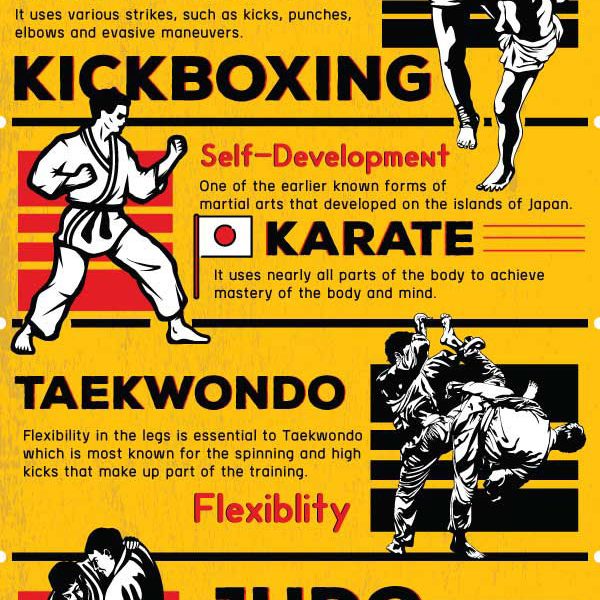The Development And Progression Of Martial Arts: Tracing Its Origins From Ancient Times To Contemporary Practices
The Development And Progression Of Martial Arts: Tracing Its Origins From Ancient Times To Contemporary Practices
Blog Article
Web Content By-Clemons Ayers
Step into the world of martial arts, where ancient origins and modern methods clash in an electrifying trip of self-control and self-discovery.
As you explore the history and advancement of this fascinating art kind, prepare to be mesmerized by the social impacts, technical advancements, and profound ideology that have shaped it over centuries.
From the battlegrounds of ancient human beings to the training premises of today, martial arts have stood the test of time, constantly adapting and expanding.
Each strike, each activity, brings with it the weight of countless years of tradition and wisdom, gave through generations. This is a story of strength, of warriors that looked for not just physical expertise, yet additionally self-confidence and consistency.
Join us on this exceptional exploration as we reveal the secrets, the tales, and the transformational power of martial arts.
Prepare https://patch.com/connecticut/southington/kids-can-karate-chop-their-way-southington-rec-program to be inspired, challenged, and forever altered by the background and evolution of martial arts.
Social Impacts on Martial Arts
As you discover the background and advancement of martial arts, you'll rapidly find the remarkable methods which cultural influences have shaped these battle methods.
From the old civilizations of China and India to the a lot more recent developments in Japan and Brazil, martial arts have been greatly affected by the cultures in which they originated.
For example, Chinese martial arts, such as Kung Fu and Tai Chi, are deeply rooted in the philosophy of Taoism and the principle of Yin and Yang.
In contrast, Japanese martial arts, like Karate and Judo, reflect the samurai warrior customs and the worths of technique and honor.
Similarly, Brazilian martial art, Capoeira, incorporates aspects of African dance and music, mirroring the social heritage of African servants in Brazil.
These cultural affects not only offer each fighting style its unique qualities but also offer a much deeper understanding of the historic and social contexts in which they evolved.
Technological Developments and Martial Arts
With the rise of sophisticated weaponry and ingenious training tools, you have actually had the ability to improve your abilities and adapt to the ever-changing fight landscape.
Technical advancements have changed the method martial arts are exercised and taught. Virtual reality simulations now allow you to train in realistic battle scenarios without the threat of physical harm. pride martial arts -speed video cameras record every move, allowing you to assess and perfect your techniques. Wearable devices check your heart rate, breathing, and muscular tissue activation, providing immediate comments on your efficiency.
Furthermore, martial arts to practice at home of customized devices, such as resistance bands and dexterity ladders, has enabled you to boost your rate, stamina, and agility. These technological innovations have not just made training a lot more reliable yet have actually also pressed the limits of what is feasible in martial arts, enabling you to get to brand-new elevations in your practice.
The Ideology and Concepts of Martial Arts
The ideology and principles of martial arts are deeply rooted in shaping your way of thinking and instilling technique, emphasis, and regard in your method.
1. Frame of mind: Martial Arts educates you to create a strong and resilient mindset. It allows you to get over difficulties both on and off the floor covering, pushing your limitations and being determined when faced with adversity.
2. Self-control: Martial Arts needs technique and self-constraint. Through routine training and adherence to strict guidelines and techniques, you find out to regulate your impulses and establish a strong job ethic.
3. Focus: Martial Arts needs extreme focus and focus. By training your mind to be present in the moment, you boost your capacity to respond swiftly and effectively during battle situations.
4. Respect: Martial Arts stresses regard for oneself, instructors, educating partners, and opponents. It instructs you to value the skills and experiences of others, cultivating a feeling of camaraderie and gamesmanship.
Conclusion
Congratulations on finishing your trip via the exciting globe of martial arts! Throughout this exploration, you have experienced the abundant history and remarkable evolution of these combat practices.
From their ancient origins to the modern-day techniques we see today, martial arts have been formed by social impacts.
The integration of innovation has actually additionally played a considerable role in revolutionizing the way martial arts are shown and practiced in the here and now day.
However, it is essential to keep in mind that martial arts are more than just physical battle. They include extensive viewpoints and leading concepts that surpass the mere act of combating.
Take a minute to reflect on this obsolete adventure and value just how the heritage of martial arts remains to flourish in the here and now, transcending time and limits.
